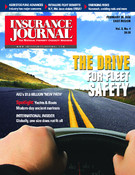Virginia House Republicans have offered a $2 billion, four-year financing plan that is underwritten partly by daunting new fines on lead-footed drivers.
It provides only about half the additional revenue for roads, commuter rails and transit that competing plans by Democratic Gov. Timothy M. Kaine and several GOP Senate leaders would generate by 2010.
More than one-fourth of the House plan is underwritten by debt that would provide northern Virginia and Hampton Roads hundreds of millions more to ease congestion that threatens to choke Virginia’s most vibrant economies.
Unlike the Senate and administration plans, the House includes no additional taxes, nor will any be added during negotiations that remain, said House Speaker William J. Howell. “The one thing that we are not, at this time, willing to compromise on is that we don’t feel that you need to raise taxes,” said Howell, R-Stafford.
As a Feb. 19 deadline for budget-related bills neared, Kaine embarked on a statewide series of town hall-style meetings beginning in Norfolk to promote his nearly $1 billion-per-year proposal, which includes an automobile titling tax increase from 3 percent to 5 percent and an increase in the insurance premium tax.
Conciliatory mood
But the administration and the House have been conciliatory, each praising portions of the other’s plans and voicing guarded optimism about a compromise.
Kaine sent Howell a letter complimenting the House for many of its ideas, particularly penalties on abusive drivers, support for stronger local land-use laws and greater outsourcing of Virginia Department of Transportation maintenance work.
Kaine’s press secretary, Kevin Hall, said several concerns were quickly obvious, but that they had encountered no immediate deal-breakers. He said the House plan applies only an additional $50 million annually to deal with a maintenance backlog already at $350 million.
The House proposes using $552 million from the current anticipated surplus of more than $1 billion in its financing package next year only, a one-time windfall that comprises one-fourth of the overall package. “So what do they choose not to fund in the introduced budget?” Hall asked.
House Republicans would also dedicate one-third of the car insurance premium tax, or $579 million over four years, to transportation.
House Democratic leaders said the GOP package was too skimpy and relied too heavily on a dubious estimate that the fines on the habitually bad drivers of hundreds or perhaps thousands of dollars would generate nearly $600 million within four years.
“It falls far short of an extensive package to address our transportation needs,” said Del. Brian J. Moran, D-Alexandria.
House Minority Leader Franklin P. Hall, D-Richmond, said the package is likely to fatten. “We may rename some things fees instead of taxes,” Hall said with a chuckle. “We’ve done that before.”
Was this article valuable?
Here are more articles you may enjoy.


 Nine-Month 2025 Results Show P/C Underwriting Gain Skyrocketed
Nine-Month 2025 Results Show P/C Underwriting Gain Skyrocketed  Chubb Posts Record Q4 and Full Year P/C Underwriting Income, Combined Ratio
Chubb Posts Record Q4 and Full Year P/C Underwriting Income, Combined Ratio  What Analysts Are Saying About the 2026 P/C Insurance Market
What Analysts Are Saying About the 2026 P/C Insurance Market  Trapped Tesla Driver’s 911 Call: ‘It’s on Fire. Help Please’
Trapped Tesla Driver’s 911 Call: ‘It’s on Fire. Help Please’ 


